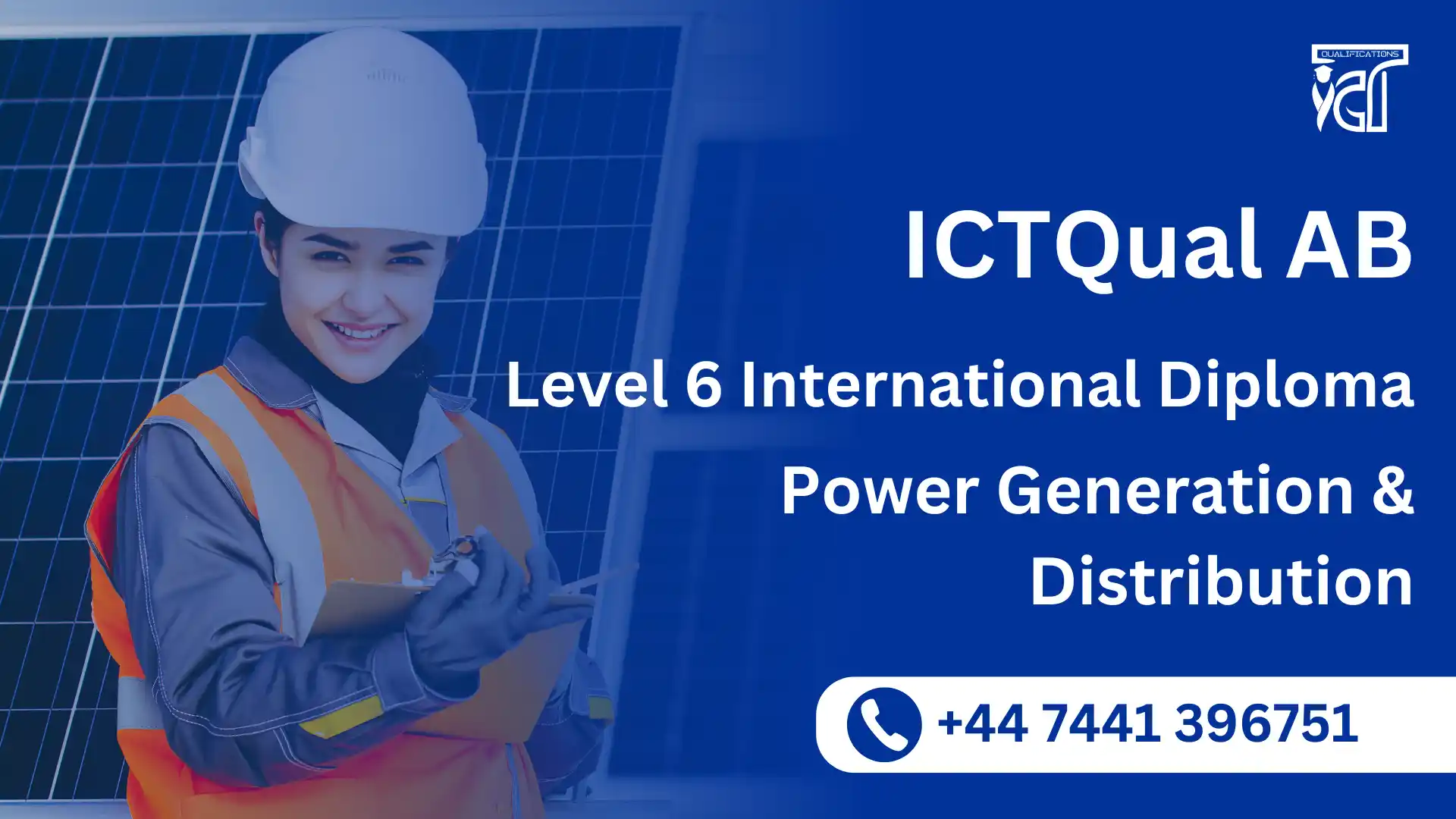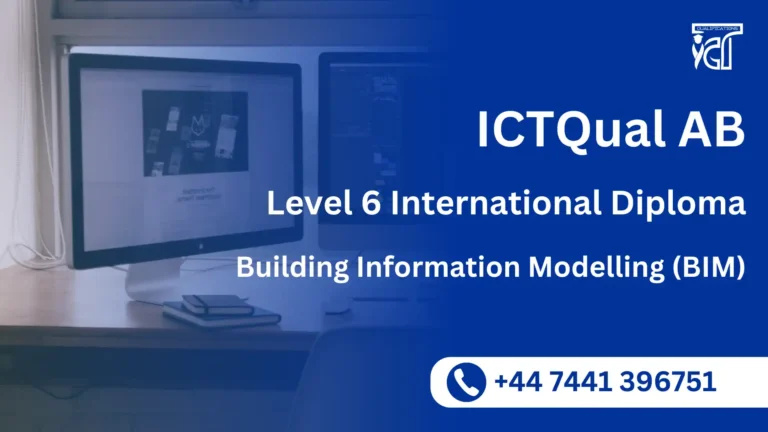The ICTQual AB Level 6 International Diploma in Power Generation & Distribution is a comprehensive, industry-focused qualification designed to equip learners with the advanced skills and knowledge required in the global power generation and distribution sector. Spanning three years and comprising 360 credits, this Level 6 diploma in power generation combines theoretical understanding with practical expertise, preparing learners for complex challenges in power systems, energy management, and electrical distribution networks.
This international diploma in power generation and distribution is suitable for both fresh learners aspiring to start a career in the energy sector and experienced professionals seeking to formalise their expertise or transition into managerial and specialist roles. Learners will gain a deep understanding of power plant operations, electrical transmission, renewable and conventional energy systems, and energy efficiency strategies. The programme emphasises hands-on skills, analytical thinking, and problem-solving capabilities essential for real-world applications in electricity generation, grid management, and industrial energy systems.
Graduates of this diploma are well-positioned for rewarding careers as Power Generation Engineers, Distribution Network Managers, Energy Analysts, or Electrical Systems Consultants. Completing this Level 6 internationally recognised qualification enhances employability, provides access to advanced studies, and equips learners with the professional credibility to drive innovation and efficiency in the global energy industry.
ICTQual AB Level 6 International Diploma in Power Generation & Distribution
This qualification, the ICTQual AB Level 6 International Diploma in Power Generation & Distribution, consists of 36 mandatory units.
Year 1 – Foundation in Power Generation & Distribution
- Principles of Electrical Power Systems
- Introduction to Power Generation Technologies
- Fundamentals of Thermal Power Plants
- Basics of Hydroelectric and Renewable Generation
- Electrical Machines and Circuit Theory
- Energy Conversion and Transmission Basics
- Health, Safety, and Environmental Awareness
- Power System Measurement and Instrumentation
- Laboratory Techniques in Electrical Systems
- Technical Report Writing
- Introduction to Power Simulation Software
- Energy Efficiency Fundamentals
Year 2 – Intermediate Power Generation & Distribution
- Advanced Thermal Power Plant Operations
- Renewable Integration in Power Systems
- Electrical Distribution Networks
- Grid Management and Load Analysis
- Power System Protection and Control
- Energy Storage and Backup Systems
- Process Control and Automation in Power Plants
- Energy Management Strategies
- Environmental Compliance and Sustainability in Power
- Quality Control and Assurance in Electrical Systems
- Project Planning and Technical Communication
- Data Analysis for Power Systems
Year 3 – Advanced Power Generation & Distribution
- Advanced Power Plant Optimisation and Troubleshooting
- Project Management in Energy Infrastructure
- Emerging Technologies in Power Generation
- Smart Grid Design and Integration
- Energy Storage Optimisation and Battery Technologies
- Risk Assessment and Hazard Analysis in Power Systems
- Advanced Laboratory Techniques and Field Testing
- Transmission and Distribution Network Planning
- Supply Chain and Logistics in Energy Operations
- Capstone Project in Power Generation & Distribution
- Professional Development and Leadership in Energy
- Strategic Decision-Making in Power Systems
Learning Outcomes for the ICTQual AB Level 6 International Diploma in Power Generation & Distribution:
Year 1 – Foundation in Power Generation & Distribution
Principles of Electrical Power Systems
- Understand the fundamental principles of electrical power generation, transmission, and distribution.
- Analyse power system components and their functions in Power Generation & Distribution.
- Apply basic electrical engineering concepts to power networks.
Introduction to Power Generation Technologies
- Comprehend various power generation methods, including thermal, hydro, and renewable sources.
- Evaluate the advantages, limitations, and applications of each technology.
- Identify operational challenges in different power plants.
Fundamentals of Thermal Power Plants
- Understand the working principles of thermal power stations.
- Analyse boiler, turbine, and generator systems.
- Evaluate efficiency, output, and environmental considerations.
Basics of Hydroelectric and Renewable Generation
- Understand hydroelectric power generation principles.
- Explore renewable energy sources and their integration into power systems.
- Assess feasibility and environmental impact of renewable projects.
Electrical Machines and Circuit Theory
- Develop foundational knowledge of electrical machines, circuits, and their operations.
- Apply circuit analysis and machine principles to practical power applications.
- Solve basic electrical engineering problems in power systems.
Energy Conversion and Transmission Basics
- Comprehend energy conversion processes in power plants.
- Understand transmission system design and operational requirements.
- Analyse efficiency and reliability of energy delivery systems.
Health, Safety, and Environmental Awareness
- Identify potential hazards in power generation and distribution environments.
- Implement safety protocols and risk mitigation measures.
- Promote environmentally responsible practices in energy operations.
Power System Measurement and Instrumentation
- Understand measurement principles and instrumentation in electrical networks.
- Apply tools and sensors to monitor system performance.
- Analyse and interpret data to ensure efficient operation.
Laboratory Techniques in Electrical Systems
- Conduct practical experiments on electrical machines and power systems.
- Collect, analyse, and interpret experimental data.
- Apply laboratory findings to support theoretical understanding.
Technical Report Writing
- Develop skills in producing professional technical documentation.
- Communicate data, analysis, and recommendations clearly.
- Apply standard formatting, referencing, and technical writing conventions.
Introduction to Power Simulation Software
- Gain basic proficiency in power system simulation tools.
- Model electrical networks to predict performance and stability.
- Use simulations to support operational decision-making.
Energy Efficiency Fundamentals
- Understand key concepts of energy efficiency in generation and distribution.
- Identify methods to optimise system performance and reduce losses.
- Apply best practices for sustainable energy utilisation.
Year 2 – Intermediate Power Generation & Distribution
Advanced Thermal Power Plant Operations
- Analyse complex thermal plant operations and workflows.
- Implement optimisation strategies for efficiency and reliability.
- Troubleshoot operational issues in high-capacity power plants.
Renewable Integration in Power Systems
- Understand the integration of renewable energy sources into existing grids.
- Analyse technical and operational challenges of mixed-energy networks.
- Implement solutions for stability and efficiency.
Electrical Distribution Networks
- Explore design, operation, and maintenance of distribution systems.
- Evaluate load flow, voltage regulation, and network protection.
- Apply principles for effective distribution planning.
Grid Management and Load Analysis
- Monitor grid performance and demand patterns.
- Implement load management strategies to optimise stability.
- Analyse faults and disruptions in power networks.
Power System Protection and Control
- Understand protection devices and control systems in power networks.
- Analyse fault detection and mitigation techniques.
- Apply control strategies to enhance safety and reliability.
Energy Storage and Backup Systems
- Explore energy storage technologies and applications.
- Assess integration of storage solutions with generation and distribution systems.
- Optimise backup systems for grid reliability.
Process Control and Automation in Power Plants
- Implement automated control systems in power generation.
- Monitor and adjust processes to maintain optimal operation.
- Apply SCADA and other automation technologies.
Energy Management Strategies
- Develop strategies to optimise energy usage and reduce operational costs.
- Apply energy auditing and monitoring techniques.
- Evaluate energy efficiency improvements in generation and distribution.
Environmental Compliance and Sustainability in Power
- Assess environmental impacts of power systems.
- Implement sustainability measures and comply with regulations.
- Promote eco-friendly and socially responsible practices.
Quality Control and Assurance in Electrical Systems
- Establish quality standards for power generation and distribution.
- Conduct inspections, testing, and validation of system performance.
- Implement corrective actions to maintain reliability and safety.
Project Planning and Technical Communication
- Plan and manage power generation and distribution projects.
- Develop clear technical documentation and communication for stakeholders.
- Apply project management tools to ensure timely completion.
Data Analysis for Power Systems
- Collect and interpret data from power systems and network operations.
- Use analytical tools to improve performance and decision-making.
- Apply insights to optimise system efficiency and reliability.
Year 3 – Advanced Power Generation & Distribution
Advanced Power Plant Optimisation and Troubleshooting
- Implement advanced strategies for power plant efficiency and reliability.
- Diagnose and resolve operational and technical issues.
- Apply analytical tools for continuous optimisation.
Project Management in Energy Infrastructure
- Plan, execute, and manage large-scale energy projects.
- Allocate resources, manage risks, and ensure compliance.
- Evaluate project performance and outcomes.
Emerging Technologies in Power Generation
- Explore innovations in power generation, including smart grids and renewable integration.
- Assess feasibility and impact of emerging technologies.
- Integrate new solutions into existing infrastructure.
Smart Grid Design and Integration
- Understand smart grid architecture, technologies, and applications.
- Implement advanced monitoring and control for grid efficiency.
- Optimise integration of distributed energy resources.
Energy Storage Optimisation and Battery Technologies
- Analyse advanced storage solutions and battery technologies.
- Integrate storage with generation and distribution systems.
- Enhance grid reliability and energy efficiency.
Risk Assessment and Hazard Analysis in Power Systems
- Conduct comprehensive risk assessments for power plants and networks.
- Develop emergency response and hazard mitigation strategies.
- Ensure compliance with safety and regulatory standards.
Advanced Laboratory Techniques and Field Testing
- Perform sophisticated testing and field measurements in power systems.
- Analyse results to inform operational decisions and optimisation.
- Apply findings to improve system reliability and safety.
Transmission and Distribution Network Planning
- Design and plan electrical transmission and distribution networks.
- Analyse load flow, stability, and network expansion.
- Ensure operational efficiency and regulatory compliance.
Supply Chain and Logistics in Energy Operations
- Manage procurement, storage, and distribution of equipment and materials.
- Optimise supply chain for efficiency and cost-effectiveness.
- Integrate logistics planning with operational management.
Capstone Project in Power Generation & Distribution
- Conduct a comprehensive project combining knowledge from all units.
- Solve real-world challenges in power generation and distribution.
- Present findings and recommendations professionally.
Professional Development and Leadership in Energy
- Develop leadership, team management, and strategic planning skills.
- Enhance decision-making, communication, and project oversight capabilities.
- Prepare for senior operational and managerial roles.
Strategic Decision-Making in Power Systems
- Apply analytical tools and frameworks to make informed energy decisions.
- Consider operational, financial, and environmental factors in strategy.
- Implement long-term plans to ensure efficient, sustainable, and reliable power systems.
The ICTQual AB Level 6 International Diploma in Power Generation & Distribution provides learners with advanced technical knowledge, practical skills, and industry-relevant expertise to excel in the energy sector. Graduates gain competencies to work effectively across power generation, electrical distribution, and energy management roles.
1. Advanced Technical Knowledge
- Understand power plant operations, electrical transmission, and distribution networks.
- Gain expertise in renewable and conventional energy systems.
- Learn energy efficiency, sustainability, and grid management strategies.
- Develop skills for monitoring, maintaining, and optimising power systems.
- Apply theoretical knowledge to real-world energy generation and distribution challenges.
2. Career Advancement Opportunities
- Prepare for roles such as Power Generation Engineer, Distribution Network Manager, Energy Analyst, or Electrical Systems Consultant.
- Enhance employability in global power and energy companies.
- Build competencies for managerial, supervisory, or specialist positions.
- Gain practical skills relevant to both industrial and utility-scale energy projects.
- Access international career opportunities in electricity generation and distribution.
3. Professional Development and Recognition
- Earn a Level 6 internationally recognised diploma in power generation and distribution.
- Formalise prior experience for professionals seeking recognition.
- Enhance leadership, strategic planning, and risk management skills.
- Build confidence in managing critical energy operations and safety compliance.
- Establish a foundation for continuous professional growth.
4. Practical and Industry-Focused Skills
- Apply knowledge to design, implement, and manage power generation projects.
- Develop analytical, problem-solving, and decision-making skills.
- Gain insights into electrical grid optimisation and energy management systems.
- Strengthen teamwork, communication, and project coordination abilities.
- Prepare for challenges in energy transition and sustainable electricity solutions.
5. Long-Term Benefits
- Achieve enhanced employability in power generation and distribution roles.
- Gain access to advanced academic pathways and specialist certifications.
- Contribute to innovative and sustainable energy solutions worldwide.
- Build professional credibility and technical mastery in the global energy industry.
- Prepare for leadership and specialist positions in renewable and conventional energy sectors.
The ICTQual AB Level 6 International Diploma in Power Generation & Distribution is designed for learners seeking technical, managerial, or specialist careers in the energy industry.
1. Fresh Learners
- Individuals starting a career in power generation, electrical distribution, or energy management.
- Recent graduates in engineering, electrical technology, or energy studies.
- Learners seeking internationally recognised qualifications in energy systems.
- Those eager to develop technical and practical skills for energy operations.
- Candidates motivated to contribute to global electricity and energy solutions.
2. Experienced Professionals
- Energy sector professionals aiming to upskill or formalise prior experience.
- Individuals seeking management or specialist roles in electricity generation and distribution.
- Learners looking to expand expertise in energy efficiency, grid management, and operational safety.
- Professionals preparing for leadership roles in energy companies or consultancies.
- Candidates wanting to strengthen career prospects and professional credibility.
3. Career Changers
- Engineers or technical staff from related fields transitioning into power generation and distribution.
- Learners seeking structured, industry-focused training with practical application.
- Individuals aiming to work in sustainable and conventional electricity operations.
- Candidates committed to long-term career growth and professional development.
- Professionals interested in driving innovation and efficiency in energy systems.
Completing the Level 6 International Diploma in Power Generation & Distribution opens pathways for academic advancement, career growth, and specialised roles.
1. Academic Progression
- Progress to Level 7 Diplomas in Power Generation, Renewable Energy, or Energy Management.
- Enrol in Master’s programmes in Energy Engineering, Electrical Power Systems, or Sustainable Energy Management.
- Access specialist certifications in electrical distribution, energy efficiency, and grid management.
- Build a foundation for research or advanced studies in power systems.
- Prepare for continuous academic and professional development.
2. Career Advancement
- Opportunities as Power Generation Engineer, Distribution Network Manager, Energy Analyst, or Electrical Systems Consultant.
- Work in global energy companies, power utilities, and consultancy firms.
- Oversee operational efficiency, project management, and sustainability initiatives.
- Prepare for senior, managerial, or specialist roles.
- Enhance global employability and industry recognition.
3. Industry Specialisation
- Develop expertise in power plant operations, electrical transmission, and distribution networks.
- Strengthen skills in renewable and conventional energy systems.
- Gain competencies for critical decision-making and operational management.
- Prepare for specialist roles in energy efficiency and grid optimisation.
- Contribute to safe, reliable, and sustainable power systems worldwide.
4. Professional Development
- Enhance leadership, problem-solving, and strategic planning skills.
- Formalise prior experience for recognition and promotion.
- Build confidence in handling complex power generation and distribution operations.
- Strengthen teamwork, communication, and project management abilities.
- Create a pathway for long-term professional growth in the global energy sector.
5. Long-Term Opportunities
- Access international career opportunities in power generation, electrical distribution, and energy consultancy.
- Enhance employability in technical, managerial, and specialist roles.
- Prepare for high-responsibility positions in global power projects.
- Contribute to innovative and sustainable energy solutions worldwide.
- Build professional credibility and expertise in one of the most critical global industries.
As an approved ICTQual AB centre, we offer two flexible certification pathways designed to meet the needs of both experienced professionals and fresh learners. These pathways ensure all learners can achieve the Level 6 International Diploma in Power Generation & Distribution and gain an internationally recognised qualification.
Route 1: Experienced Professionals
- This pathway is specifically for learners with at least six years of verifiable experience in power generation, electrical distribution, or related energy sectors.
- Recognises prior professional expertise, allowing experienced learners to fast-track their diploma completion.
- Learners focus on advanced modules, strategic projects, and applied learning to consolidate their industry knowledge.
- Ideal for professionals seeking managerial, leadership, or specialist roles within power generation and distribution.
- Successful completion provides a globally recognised Level 6 qualification, enhancing career prospects and professional credibility.
Route 2: Fresh Learners
- Designed for learners new to power generation or electrical distribution.
- Requires completion of 36 structured assignments covering all core units of the diploma.
- Focuses on hands-on skills, analytical thinking, and practical application in real-world energy systems.
- Suitable for individuals starting their career in the renewable and conventional energy sector.
- Graduates earn a fully accredited Level 6 diploma, opening pathways to employment, higher studies, and professional development.
Entry Requirements
To ensure learners are fully prepared to succeed in the ICTQual AB Level 6 International Diploma in Power Generation & Distribution, clear entry requirements are in place. These criteria consider age, educational background, professional experience, language proficiency, and essential skills.
1. Minimum Age
- Learners must be 18 years or older at the time of enrolment.
- Ensures learners have the maturity and commitment to engage with advanced technical concepts and professional development.
2. Educational Background
- A Level 5 Diploma or equivalent in a relevant field is recommended, such as:
- Electrical, Mechanical, or Energy Engineering
- Power Systems or Energy Technology
- Environmental Science or Renewable Energy Studies
- Candidates should have a foundational understanding of mathematics, physics, and engineering principles.
- For learners without formal qualifications, Route 1 (Experienced Professionals) allows entry based on verifiable work experience.
3. Professional Experience
- Route 1 (Experienced Professionals):
- Minimum of six years of verifiable experience in power generation, electrical distribution, or related energy sectors.
- Experience should demonstrate knowledge of energy operations, grid management, and safety compliance.
- Recognises prior expertise and allows for faster diploma completion.
- Route 2 (Fresh Learners):
- No prior experience required.
- Learners must complete 36 structured assignments covering all core units to gain comprehensive knowledge and practical skills.
4. Language Proficiency
- Competence in English, both written and spoken, is essential for understanding technical content, completing assignments, and engaging with tutors.
- Recommended: IELTS 5.5 or equivalent for non-native English speakers.
- Ability to read and comprehend technical manuals, operational procedures, and energy regulations.
Register Now
Qualification Process
Qualification Process for the ICTQual AB Level 6 International Diploma in Power Generation & Distribution
- Self-Assessment:
Begin by evaluating your eligibility to ensure you meet the qualification requirements, including work experience, knowledge, and language proficiency. - Registration:
Complete your registration by submitting the required documents, including a scanned copy of a valid ID, and paying the registration fee. - Induction:
An assessor will conduct an induction to confirm your eligibility for the course and explain the evidence requirements. If you do not meet the criteria, your registration will be cancelled, and the fee will be refunded. - Assignments & Evidence Submission:
Provide all assignments and the necessary evidence based on the assessment criteria outlined in the course. If you are unsure of the required evidence, consult with the assessor for guidance on the type and nature of evidence needed. - Feedback and Revision:
The assessor will review your submitted evidence and provide feedback. Evidence that meets the criteria will be marked as “Criteria Met,” while any gaps will be identified. You will be asked to revise and resubmit if needed. - Competence Evidence:
Submit final evidence demonstrating that all learning outcomes have been met. This evidence will be marked as “Criteria Met” by the assessor once it is satisfactory. - Internal Quality Assurance (IQA):
The Internal Quality Assurance Verifier (IQA) will review your evidence to ensure consistency, quality, and compliance with standards. - External Verification:
The IQA will submit your portfolio to ICTQUAL AB External Quality Assurance Verifiers (EQA) for final confirmation. The EQA may contact you directly to verify the authenticity of your evidence. - Certification:
Upon successful completion of all checks, ICTQUAL AB will issue your official certificate, confirming that you have attained the ICTQual AB Level 6 International Diploma in Power Generation & Distribution.







